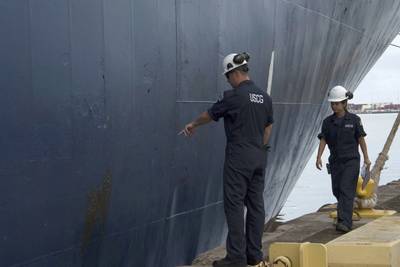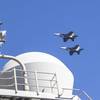Safeguarding the Maritime Transportation System During the COVID-19 Pandemic
The marine transportation system (MTS) is critical to both our national security and economic prosperity. The U.S. Coast Guard has an enduring responsibility to safeguard the MTS and enable the uninterrupted flow of maritime commerce. While Coast Guard Prevention missions normally address the systemic risks to the MTS through a variety of regulatory and compliance activities on a day-to-day basis, the COVID-19 response demands a flexible approach to prevent an undue backlog from causing MTS delays today and in the near term. The Coast Guard will continue to safeguard the MTS during this national emergency, using the same principles of Coast Guard operations that have guided our service for more than two centuries.
The Coast Guard is committed to minimizing the risk that COVID-19 poses to the maritime industry and those that support this critical infrastructure. Prevention professionals from Coast Guard Headquarters to those in the field will continue to coordinate with diverse governmental and non-governmental stakeholders in a cooperative effort to safeguard the MTS. Captains of the Port (COTPs) and Officers in Charge, Marine Inspection (OCMIs) distributed throughout the nation have the appropriate authorities to provide an effective presence to quickly address the unique risks associated with their respective region and engage decisively on-scene with local partners.
The Centers for Disease Control (CDC) has put in place a number of public health policies with a maritime nexus. Of note is their Interim Guidance for Ships on Managing Suspected Coronavirus Disease 2019. The recommendations include preventive measures for crew, PPE use, supplies and cleaning and disinfection guidance. Stakeholders may also consider benchmarking with industry associations who have already promulgated guidance such as Pandemic Information & Resources for the Towing Industry from the American Waterways Operators. The Offshore Marine Service Association (OMSA) has also released Guidance on Personnel Transport During the COVID-19 Pandemic.
Coast Guard Headquarters has released a series of Marine Safety Information Bulletins (MSIBs) based on managed risk, flexibility and restraint. The Coast Guard at all levels continue to apply maximum flexibility and creative solutions that balance our regulatory framework given the constraints imposed through a worldwide pandemic. When a condition exists which requires the Coast Guard to intercede, our Prevention professionals will use the minimum action needed to reduce the excessive risk to an acceptable level.
The Coast Guard has released the following MSIBs related to COVID-19:
02/20: COVID-19 CH3
06/20: COVID-19 Vessel Reporting Requirements for Illness or Death
07/20: COVID-19 Port and Facility Operations
08/20: COVID-19 Mariner Credentials
09/20: COVID-19 Vessel Inspections, Exams, and Documentation
10/20: COVID-19: Guidance for Maritime Operations on Compliance with Federal Drug Testing Requirements
11/20: Maintaining Maritime Commerce and Identification of Essential Maritime Critical Infrastructure Workers
12/20: COVID-19 – Vessel and Facility Response Plans
13/20: COVID 19 – Transportation Worker Identification Credential (TWIC) Operations
14/20: COVID-19: Ballast Water Management (BWM) Extensions
The Coast Guard will continue to use MSIBs to keep the marine industry informed during this dynamic period, and actively seek out communication with stakeholders to adjust our policies as needed in the coming months.
 Rear Admiral Richard V. Timme is the U.S. Coast Guard's Assistant Commandant for Prevention Policy. |














